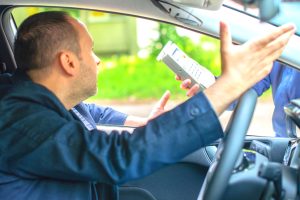In Florida, breathalyzer tests are one of the most common tools used by law enforcement officers to glean proof of the blood-alcohol concentration of a motorist suspected of driving under the influence (DUI), in violation of F.S. 316.193. But can you refuse to take the test? Can you be forced to take one? If you refuse, can you still be convicted? 
Short answers:
- Yes – but not without consequences.
- No – though officers can initiate a non-consensual blood draw in some circumstances.
- Yes – because breathalyzers aren’t the only relevant evidence in Florida DUI cases.
Implied Consent in Florida
As our West Palm Beach DUI defense attorneys can elaborate, Florida has an implied consent law (F.S. 316.1932). This law states that anyone who accepts the privilege of operating a motor vehicle in this state is deemed to have given consent to submit to an approved chemical or physical test administered by authorities for the purpose of determining the alcoholic content of his or her blood or breath. The test must be incidental to a lawful arrest, administered by a law enforcement officer who has reasonable cause to believe the person was driving or in actual physical control of the vehicle while under the influence of alcohol.
Reasonable suspicion of a DUI can include things like:
- A driver traveling far below the speed limit with road conditions that don’t justify it.
- A driver who is swerving or operating the vehicle erratically.
- Failure to obey traffic signals.
- High beams kept on despite incoming traffic.
- No headlights on at night or at other times of low visibility.
- Tailgating/following too closely.
- Frequent stops or braking for no apparent reason.
- Illegal turns.
- A driver nearly hits an object, other cars, or pedestrian.
As to whether it’s better to submit or refuse, there are pros and cons to each. Refusal to submit to testing under the state’s implied consent law will result in an automatic one-year license suspension, and your refusal can be used against you in criminal court. That said, refusal effectively deprives prosecutors of a key piece of evidence that can be used against you in the DUI criminal case.
It’s worth noting that if you do choose to submit, there is an extensive history of technical problems associated with the Intoxilyzer 8000 (the machine most commonly used to administer roadside breath tests). Much of it comes down to human error and improper training on how to use the device to glean effective BAC results. These facts might be used by South Florida DUI defense lawyers in challenging the BAC results.
 Fort Lauderdale Criminal Attorney Blog
Fort Lauderdale Criminal Attorney Blog


